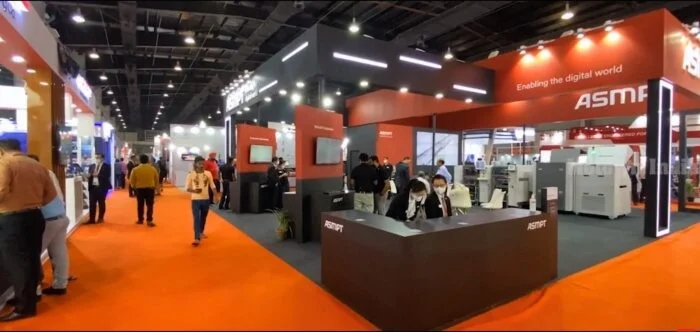It is imperative to understand the nuances of various industry events to maximize learning opportunities and growth. Conferences and trade shows are two of the most prominent types. So, Conference vs. trade shows: what makes them differ?
A conference primarily serves as an educational and professional development platform, enriched with speakers and workshops, and concentrates on imparting industry-specific knowledge.
In contrast, a trade show is more business-centric, where companies showcase and demonstrate their products, focusing on marketing strategies and industry trends.
This blog will guide you through these distinctions, helping you decide which event aligns best with your professional needs. Stay tuned as we unpack the unique aspects of each, ensuring you make the most informed decisions in your industry engagements.
A Quick Overview of the Conference and Trade Show
Conferences and trade shows are pivotal in today’s professional world, each offering unique benefits and experiences. While they share similarities in bringing together industry professionals, their objectives and formats differ significantly.
Conferences offer attendees a valuable opportunity to enhance their education and professional development by engaging with experts in the field. These gatherings commonly include keynote presentations, interactive workshops, and insightful panel discussions, all geared towards enriching participants’ knowledge and skill sets.
When you attend a conference internationally, you not only acquire new insights and abilities but also connect with like-minded individuals from all around the globe, promoting a collaborative atmosphere where ideas are freely exchanged. Networking at these events is pivotal, yet it’s predominantly focused on idea-sharing rather than purely business transactions.
Trade shows, on the other hand, are distinctly business-oriented and driven by marketing objectives. Here, companies showcase their latest products and services, demonstrating their innovations to potential clients and partners. The atmosphere is vibrant, with an emphasis on building business relationships and exploring the latest industry trends.
Different Types of Conferences You Can Attend
Conferences offer diverse learning, networking, and professional development opportunities, each tailored to specific industries and interests. From academic symposiums to industry-specific gatherings, the variety of different types of conferences is vast. Here are the types of conferences available that can help professionals choose the most beneficial one for their career growth.
Academic Conferences
Academic conferences are centered around research and scholarly discussions in specific fields of study. They typically feature presentations of papers, findings, and theories by researchers and academicians. These gatherings are ideal for students, educators, and scholars keen on academic discourse. Networking opportunities are rich, fostering collaborations and intellectual exchanges.
Industry-Specific Conferences
These conferences are tailored to sectors such as technology, healthcare, or finance. They provide insights into industry trends, challenges, and innovations. Attendees include professionals and experts from the particular sector, offering targeted networking opportunities. These events are crucial for staying updated in one’s field.
Professional Development Conferences
These conferences offer workshops, training sessions, and keynote speeches focusing on skill enhancement and career advancement. They are ideal for professionals looking to upgrade their skills and knowledge. Such conferences span various industries, offering a broad spectrum of learning opportunities. They are excellent for personal and professional growth.
Networking Conferences
These are designed primarily to facilitate connections among professionals. They might include mixers, meet-and-greets, and collaborative projects. The focus is on building relationships rather than on specific content or training. They’re perfect for expanding one’s professional network and finding new opportunities.
In summary, the conference landscape is diverse, each type offering unique benefits and learning opportunities. Whether deepening academic knowledge, staying abreast of industry trends, enhancing professional skills, or expanding your network, there’s a conference tailored to your needs. Choosing the right one can be a significant step in your professional journey.
Different Types of Trade Shows You Can Attend
Businesses and individuals alike can benefit from trade shows, offering a spectrum of opportunities. There is a wide range of focus and scale among these events, catering to a variety of industries and interests. For instance, Global Expo organized an international expo, which broadened the horizons for both exhibitors and attendees. Participating in or attending a trade show can be significantly enhanced by understanding the types available.
Consumer Trade Shows
Consumer trade shows are public events showcasing products directly to consumers. They are ideal platforms for product launches and brand exposure. These shows enable direct interaction with end-users, gathering valuable feedback and insights. They often feature live demonstrations, interactive sessions, and opportunities for direct sales.
Industry-Specific Trade Shows
Focused on specific sectors, these trade shows cater to professionals within those industries. They facilitate networking among industry peers and showcase specialized products and services. These events are key for staying updated with industry trends and advancements. They are essential for professionals seeking a competitive edge in their field.
B2B Trade Shows
Business-to-business (B2B) trade shows are exclusive events for industry professionals and companies. They focus on networking and partnerships rather than direct sales to consumers. These shows are ideal for forging new business relationships and exploring collaborative opportunities. They often feature conferences and seminars alongside the exhibition.
In summary, the trade show landscape is diverse, each type serving a unique purpose. Whether engaging directly with consumers, diving deep into an industry, or building B2B connections, there’s a trade show for every need. Understanding these variations ensures businesses and professionals can strategically choose the suitable events to attend, aligning with their goals and target audience.
Is a Trade Show the Same as a Conference?
No, a trade show is not the same as a conference. While both are significant events in the professional world, they serve distinct purposes and offer different experiences. Understanding these differences is crucial for attendees to maximize the value they derive from each.
Purpose and Focus
Conferences primarily focus on education, professional development, and knowledge sharing within a specific field. They often feature keynote speakers, workshops, and panel discussions. Conversely, trade shows are commercial events centered on marketing and business transactions. Companies exhibit their products and services here, targeting potential clients and partners.
Target Audience
Conferences cater to professionals seeking knowledge and networking opportunities within their industry. Attendees are usually there to learn, share ideas, and enhance their professional skills. Trade shows, on the other hand, attract a mix of business representatives, potential buyers, and industry insiders. They are more about showcasing products and fostering business relationships.
Content and Activities
The content of conferences is predominantly educational, including lectures, seminars, and interactive sessions. These activities are designed to provoke thought and discussion. Trade shows focus on product displays, demonstrations, and sales pitches. They provide a platform for businesses to exhibit their latest offerings and market trends.
In summary, while both trade shows and conferences are essential in the business and professional world, they are distinct in their objectives, target audiences, and activities. Recognizing these differences helps individuals and businesses decide which type of event aligns best with their specific needs and goals, ensuring a more beneficial and targeted experience.
Conference Vs Trade Show – Which One Should You Choose to Attend?
Choosing between attending a conference or a trade show hinges on your professional objectives and industry needs. Both offer unique benefits and opportunities but cater to different aspects of professional development and business growth. Understanding what each event offers is key to making an informed decision that aligns with your goals.
Professional Development: Conferences
If your aim is to deepen knowledge and expertise in your field, conferences are the ideal choice. They offer a wealth of learning opportunities through workshops, seminars, and keynote speeches. These events are perfect for professionals seeking to stay abreast of the latest industry research, trends, and innovations.
Conferences also provide a platform for networking with peers and thought leaders. This can lead to fruitful collaborations and career advancement opportunities. They are particularly beneficial for those looking to enhance their skills, gain insights, and contribute to discussions in their professional community.
Business Growth: Trade Shows
For businesses looking to expand their market reach, trade shows are invaluable. These events allow companies to showcase their products or services, engage with potential clients, and observe competitors. Trade shows are ideal for launching new products and gauging market interest.
They also offer networking opportunities but focus on business partnerships and sales. Attending a trade show can lead to direct business opportunities, client acquisitions, and valuable industry connections. It’s a strategic choice for businesses aiming to increase their visibility and market presence.
Your specific professional goals should guide the decision to attend a conference or a trade show. Conferences are best for those seeking knowledge and professional development, while trade shows are more suited for businesses focused on market expansion and sales. Understanding the unique offerings of each can help you choose the event that will most effectively support your professional journey or business strategy.
Pros and Cons of Conferences
Conferences are a cornerstone of professional development, offering a range of benefits and some drawbacks. They provide opportunities for learning, networking, and staying updated with industry trends. However, like any event, they come with their own set of limitations. Here’s a balanced view of the pros and cons of attending conferences:
Pros
- Access to the latest industry knowledge and research through expert speakers and panel discussions.
- Opportunities for networking with peers, mentors, and industry leaders, fostering professional relationships.
- Exposure to new ideas and perspectives, enhancing creativity and problem-solving skills.
- Professional development through workshops and seminars, contributing to career growth.
- Potential to earn continuing education credits, required in many professions.
- Discovering new tools, technologies, and methods relevant to your field.
- A chance to present your work and receive feedback, aiding personal and professional growth.
Cons
- Conferences can be expensive, considering registration fees, travel, accommodation, and related costs.
- Time away from work or personal commitments requires careful planning and time management.
- Information overload makes it challenging to assimilate and apply all learned concepts.
- Not all sessions may be relevant or of interest, leading to some inefficiencies.
- Networking can be intimidating or difficult for some, potentially limiting the opportunity for connections.
Conferences offer a rich environment for professional growth, learning, and networking. While they have drawbacks, such as cost and time commitment, the benefits often outweigh these considerations. Careful selection and planning can maximize the positive aspects of conference participation, making it a valuable experience for many professionals.
Pros and Cons of Trade Shows
Trade shows play a pivotal role in the business landscape, offering unique opportunities for companies to showcase their products and services. They are dynamic platforms for networking, marketing, and learning about industry trends. However, like any business strategy, they have advantages and disadvantages.
Pros
- Direct exposure to potential customers and clients, increasing brand visibility.
- Opportunity to network with industry professionals and build valuable business relationships.
- It is ideal for launching new products and receiving immediate market feedback.
- Competitive analysis facilitated by observing and learning from industry peers.
- Enhanced marketing through live demonstrations and interactive product displays.
- Generates leads and sales opportunities, potentially boosting revenue.
- Offers insights into current market trends and consumer preferences.
Cons
- High costs associated with booth rental, setup, travel, and accommodation.
- Time-consuming preparation and involvement, diverting resources from other business operations.
- Potentially low return on investment if the event doesn’t meet expectations.
- Limited reach to only the attendees of the particular trade show.
- Risk of not standing out among numerous exhibitors.
In summary, trade shows offer significant opportunities for business growth and market exposure, yet they demand considerable investment and planning. The potential benefits include increased brand visibility, networking opportunities, and direct customer engagement.
However, the financial and time commitments and the uncertain ROI are important factors to consider. Weighing these pros and cons is crucial for businesses to determine if participating in a trade show aligns with their marketing strategies and objectives.
Final Briefs
A thorough understanding of the differences between conferences and trade shows is essential to understanding the “Conference vs. trade Show” landscape. Conferences are pivotal for professional development, offering a platform for education, networking, and exposure to new ideas.
Conversely, trade shows are instrumental for businesses seeking market expansion, providing opportunities for product showcasing and forging vital business connections. Each has its pros and cons, from the cost and time investment to the potential for significant professional and business growth.
Making an informed choice between these two depends on individual career goals and business strategies. Accurately assessing your needs and understanding the unique benefits of each can lead to more effective and rewarding participation, shaping your professional path or business trajectory in meaningful ways.








